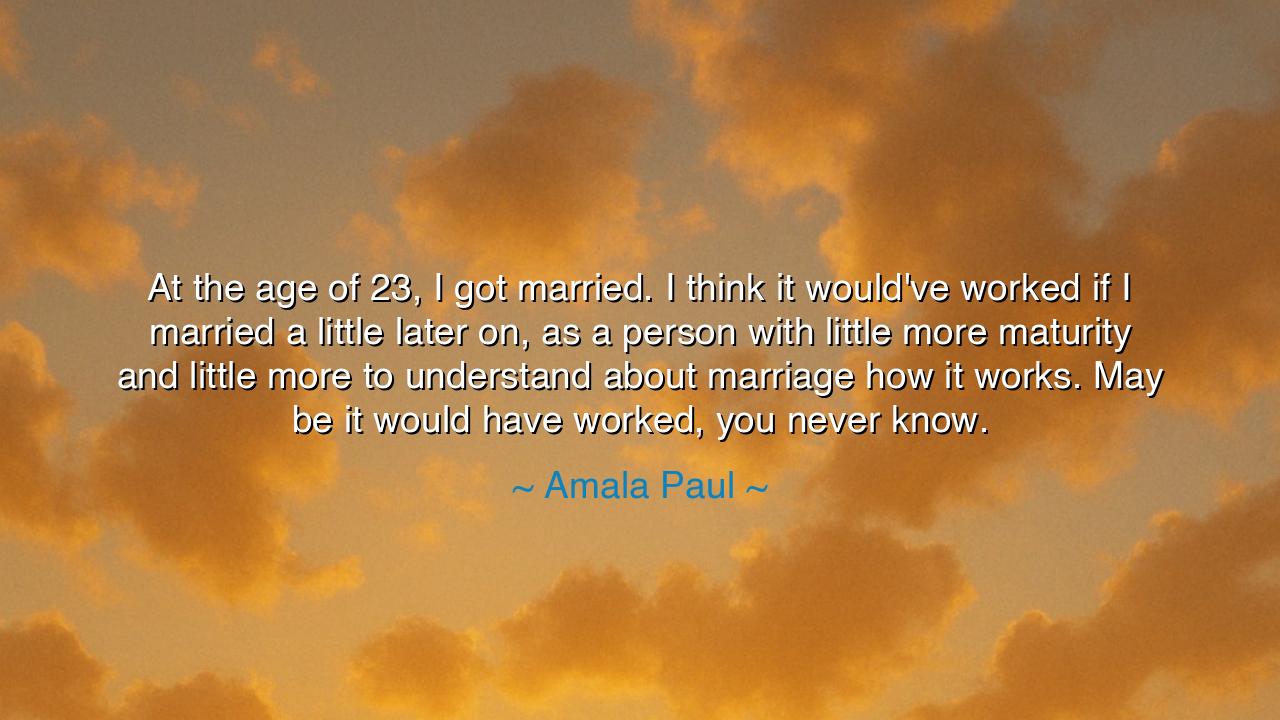
At the age of 23, I got married. I think it would've worked if I
At the age of 23, I got married. I think it would've worked if I married a little later on, as a person with little more maturity and little more to understand about marriage how it works. May be it would have worked, you never know.






In the journey of life, there are moments when our choices, particularly those made in the early seasons of our existence, define not just the path ahead, but also the lessons we must learn along the way. Amala Paul, in her reflective wisdom, once shared: “At the age of 23, I got married. I think it would’ve worked if I married a little later on, as a person with a little more maturity and a little more to understand about marriage and how it works. Maybe it would have worked, you never know.” These words echo with the regret and reflection that many of us face when we look back at pivotal decisions made in the youth of our lives. At 23, youthful enthusiasm often overshadows the deeper understanding required for the sacred bonds of marriage. Yet, Amala Paul’s words carry with them not only the weight of reflection but also a call to acknowledge the importance of timing and maturity in shaping a life that fulfills its deepest potential.
What, then, does Amala Paul mean when she speaks of marrying at the age of 23 and the need for more maturity? Marriage, as she implies, is not merely the union of two people, but a profound journey of growth, understanding, and self-discovery. In youth, we often believe that love is enough to carry us through the challenges of life, yet the trials of marriage require a wisdom that comes from experience, from having lived through the joys and pains that life presents. Youth brings with it the fervor of passion, the excitement of new beginnings, but it is only with maturity that we can approach the complexities of marriage with the grace, patience, and understanding it demands.
The ancient wisdom of the Greeks teaches us that virtue and wisdom are gained not by mere experience, but by the reflection upon that experience. Consider the words of the great philosopher Aristotle, who spoke of the importance of phronesis—practical wisdom—especially in the context of relationships. Aristotle believed that the most successful relationships were built not on impulse or youthful passion alone, but on a foundation of understanding, self-awareness, and emotional maturity. In the context of marriage, this wisdom is critical, for a union is not just the joining of hearts, but the merging of two lives, each with its own baggage, dreams, and fears. To truly understand the delicate balance of such a relationship, one must first have the maturity to recognize one’s own strengths and weaknesses, and to approach the union with a sense of shared responsibility.
Let us also look at the story of Cleopatra and Julius Caesar, whose early relationship was driven by ambition and political necessity. Cleopatra, though a woman of great intelligence and political acumen, was young when she entered into this powerful union. Though they shared a deep bond, Cleopatra’s youth was marked by a lack of experience in navigating the complex world of Roman politics, a world that demanded maturity and long-term vision. Their relationship, though legendary, was often marked by turbulence and unforeseen challenges. In later years, Cleopatra’s union with Mark Antony seemed to carry more of the weight of experience, yet even then, it was their maturity in dealing with the forces that shaped their world that allowed them to navigate the intense pressures they faced. Thus, we see that marriage, even among the most powerful and accomplished, requires more than passion—it requires the wisdom gained through years of life experience.
Amala Paul’s reflection on marriage also invites us to understand that, though youth may be a time of powerful emotion, it is not always the right time for the heavy commitments that come with lifelong unions. The timing of one’s decisions is as important as the decisions themselves. Like the wise gardener who waits for the right season to plant a seed, so too must we wait for the right moment to make commitments that will shape the rest of our lives. There is no shame in acknowledging that our youthful decisions, however well-intentioned, may have lacked the necessary insight and wisdom that time would have offered.
What, then, can we learn from Amala Paul’s words? The lesson here is not one of regret, but of growth and self-awareness. It is a call to recognize the importance of maturity in all aspects of life, especially in relationships. We must understand that some things, such as the depth of a marriage, require the seasoning of time, the patience of experience, and the strength of self-reflection. In our pursuit of love and companionship, we must honor the time it takes to truly know ourselves and understand the delicate balance required to build a lasting bond.
Therefore, let us not rush into commitments out of the exuberance of youth, but instead, let us approach them with the wisdom of patience and understanding. Let us honor the maturation of our souls, recognizing that the journey of life is not a sprint but a steady walk toward deeper insight. And in doing so, we will find that the decisions we make in our later years are more rooted in wisdom and grace, leading us to relationships that are not only fulfilling but enduring. Maturity is the key that unlocks the full potential of all relationships, and it is through patience and growth that we come to understand the true meaning of love and commitment.






AAdministratorAdministrator
Welcome, honored guests. Please leave a comment, we will respond soon